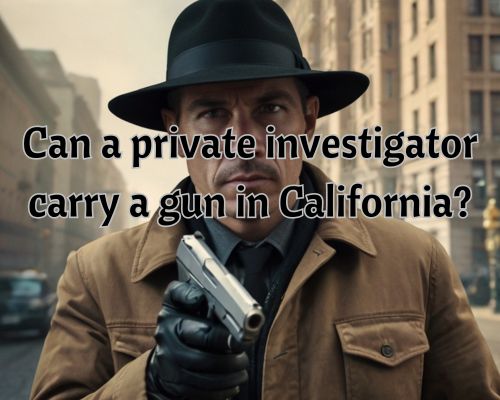If you’re considering a career as a private investigator in California or simply curious about the profession’s regulations, you might wonder about their rights concerning firearms. Let us know this with Sherlock Holmes from Ali Private Investigator Tampa.

In California, a private investigator can carry a firearm, provided they meet specific requirements.
These include having a valid BSIS exposed firearms permit, a concealed weapons permit issued by local law enforcement, or being a retired peace officer with relevant endorsements.
The regulations are strict and vary depending on whether the investigator works independently or within an agency.
For instance, if you hire a private investigator who also provides armed bodyguard services incidental to an investigation, they must carry a commercial general liability policy from an authorized insurance company. This ensures that any potential risks associated with carrying a firearm are mitigated by proper coverage.
Understanding these rules not only provides clarity but also emphasizes the importance of adherence to state laws.
Private investigators must navigate complex regulations to maintain their ability to legally carry a gun, reflecting the intersection of personal security and professional responsibility in California.
Eligibility and Requirements for Firearms Carry by Private Investigators
California has specific regulations governing the eligibility and requirements for private investigators to carry firearms. You must adhere to the licensing procedures dictated by the BSIS, complete mandatory firearms training, and pass comprehensive background checks for legal compliance.
Licensing Procedures and BSIS Regulations
To carry a firearm as a private investigator in California, you need to follow the regulations set by the Bureau of Security and Investigative Services (BSIS).
You must first possess a valid Private Investigator license in good standing. After that, you are required to apply for a firearms permit from the BSIS.
Important steps include:
- Complete the BSIS Firearms Permit Application
- Provide proof of U.S. citizenship or legal residency
- Pay the associated fees
Additionally, the permit must be renewed every two years. Failure to adhere to these procedures or letting your Private Investigator license lapse can result in the inability to legally carry a firearm.
Firearms Training and Safety Certification
Before carrying a firearm, you must undergo rigorous training and certification.
California mandates that private investigators complete a 14-hour training course. This course covers both the practical handling of a firearm and theoretical aspects such as legal use of force and safety protocols.
Key components include:
- Classroom instruction (8 hours)
- Range training and qualification (6 hours)
After completing the training, you need to pass both written and shooting proficiency exams. Only then will you be eligible to apply for the firearms permit. Frequent refresher courses may also be recommended or required, especially during permit renewal.
Background Checks and Legal Compliance
Being legally compliant is vital for carrying a firearm.
This involves undergoing thorough background checks. The BSIS requires fingerprinting and submission of personal details to the Department of Justice (DOJ) and the Federal Bureau of Investigation (FBI).
Process Outline:
- Submit fingerprints via the Live Scan process
- Wait for background check results from DOJ and FBI
- Ensure no criminal history that would disqualify you from owning or carrying a firearm
Character references and continuous good standing are also monitored. Violations of the law or BSIS regulations can result in revocation of both your PI license and your firearms permit.
Operational Considerations for Armed Private Investigators
Sherlock Holmes from Ali Private Investigator Tampa highlights that when engaging in investigations with a firearm, you must consider legal restrictions and how to handle public safety and responsibilities effectively.
Carrying and Utilizing Firearms during Investigations
In California, you can carry a firearm if you meet certain prerequisites such as obtaining a Private Investigator Firearms Permit. You also need proper training and licenses.
The Department of Justice (DOJ) mandates background checks and proficiency in firearm handling.
Your use of firearms should strictly follow state laws.
Unauthorized use can result in severe penalties, including loss of your PI license and potential criminal charges.
Firearms should be employed only when absolutely necessary to protect life or in exigent circumstances, not for intimidation or display.
Public Safety and Responsibilities
Armed private investigators must always prioritize public safety. This includes using firearms only as a last resort. They should also ensure that the firearms are securely holstered during non-critical situations.
Situational awareness is crucial. You should be aware of your surroundings and avoid actions that might endanger the public.
Coordination with local law enforcement is also essential. In emergencies, prompt communication with the police department can prevent misunderstandings and potential conflicts. Reporting any firearm discharge or significant incident is required by law. Failure to do so could compromise your legal standing.
Adhering to these principles ensures that your operations are conducted responsibly and legally, maintaining the trust and safety of the community.
